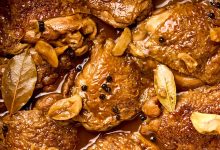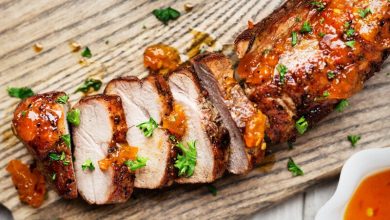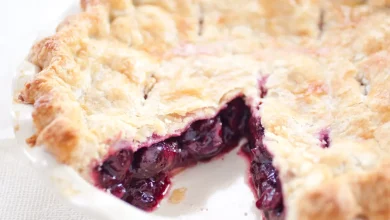All Most Mashed Potatoes is a unique and flavorful twist on traditional mashed potatoes. It’s a dish that combines creamy mashed potatoes with various flavorful ingredients to create a delightful side dish. While it’s not a widely recognized or historical dish, it’s a creative culinary invention that can add a new dimension to your meals.
Components:
The components of All Most Mashed Potatoes typically include:
-
Potatoes: The main ingredient is, of course, potatoes. You can use Yukon Gold, russet, or any other variety of potatoes you prefer.
-
Butter: Butter adds richness and creaminess to the mashed potatoes.
-
Milk or Cream: Either milk or cream is used to achieve the desired consistency and creaminess.
-
Garlic: Garlic cloves are often minced or roasted for a savory flavor.
-
Cheese: Cheese, such as cheddar or Parmesan, can be added for extra flavor and creaminess.
-
Herbs and Spices: Seasonings like salt, pepper, and fresh herbs like chives or parsley can enhance the flavor.
-
Optional Ingredients: You can get creative with ingredients like bacon bits, sour cream, or even roasted vegetables to add extra depth and texture.
Steps to Prepare All Most Mashed Potatoes:
-
Peel and Dice Potatoes: Start by peeling and dicing the potatoes into evenly sized pieces. This ensures even cooking.
-
Boil Potatoes: Place the diced potatoes in a large pot, cover them with cold water, and add a pinch of salt. Bring to a boil and simmer until the potatoes are fork-tender, usually around 15-20 minutes.
-
Drain and Mash: Drain the cooked potatoes and return them to the pot. Mash them using a potato masher or a ricer.
-
Add Butter and Milk: Add butter and milk (or cream) to the mashed potatoes and continue mashing until they reach your desired creaminess. Adjust the amount of butter and milk to taste.
-
Season: Season the mashed potatoes with salt, pepper, minced garlic, and any other desired herbs and spices. Mix well.
-
Add Cheese: If you want cheesy All Most Mashed Potatoes, fold in grated cheese at this point. Stir until the cheese is melted and well combined.
-
Optional Ingredients: If you’re adding bacon bits, sour cream, or roasted vegetables, gently fold them into the mashed potatoes.
-
Serve: Transfer the All Most Mashed Potatoes to a serving dish, garnish with fresh herbs, and serve hot.
Preparation Time:
The time needed to prepare All Most Mashed Potatoes depends on the quantity you’re making and your cooking skills. On average, it can take around 30 to 45 minutes from start to finish, including the time to boil the potatoes.
This dish offers endless possibilities for customization, so feel free to experiment with different ingredients and flavors to suit your preferences. Enjoy your All Most Mashed Potatoes!
All Most Mashed Potatoes can be a delicious side dish, but it’s important to be aware of its nutrition facts and health information. Here’s a general overview:
Nutrition Facts (per serving, approximate):
-
Calories: Approximately 200-300 calories per serving, depending on ingredients and portion size.
-
Carbohydrates: About 30-40 grams, primarily from potatoes.
-
Protein: Around 4-6 grams, depending on the addition of cheese or other protein sources.
-
Fat: Roughly 8-12 grams, mainly from butter and cheese.
-
Fiber: About 2-3 grams, mainly from potatoes.
-
Sodium: The sodium content can vary based on the amount of salt added during cooking. Aim to control sodium if needed for dietary restrictions.
-
Vitamins and Minerals: All Most Mashed Potatoes are a good source of potassium, vitamin C, and other essential nutrients found in potatoes.
Health Information:
-
Moderation: While mashed potatoes can be a nutritious side dish, it’s essential to consume them in moderation. The addition of butter, cream, and cheese can increase the calorie and fat content.
-
Carbohydrates: Potatoes are a starchy vegetable, so be mindful of your carbohydrate intake, especially if you’re monitoring your blood sugar levels.
-
Fiber: The fiber content in mashed potatoes is relatively low. Consider incorporating other fibrous foods into your meal to boost fiber intake.
-
Portion Control: Pay attention to portion sizes to avoid overeating. Smaller servings can help you manage your calorie intake.
-
Customization: You can make All Most Mashed Potatoes healthier by using lower-fat dairy options, reducing butter, and incorporating roasted vegetables for added nutrients and fiber.
-
Allergies and Dietary Restrictions: Be cautious if you have allergies or dietary restrictions. Some variations of All Most Mashed Potatoes may contain ingredients like gluten, dairy, or nuts.
Remember that the nutritional content of your All Most Mashed Potatoes can vary depending on your specific recipe and ingredient choices. If you have specific dietary concerns or health goals, it’s advisable to consult with a nutritionist or healthcare professional for personalized guidance.





